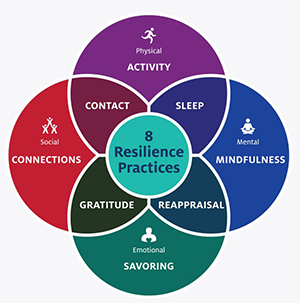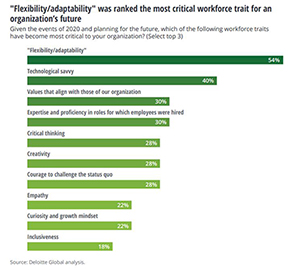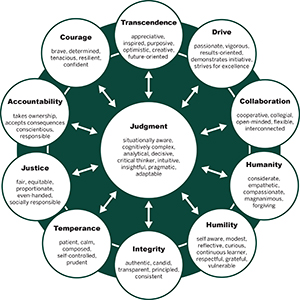Resilience Leadership
Resilience at the individual, team and organizational levels has become the ‘order of the day’ especially in the ever Volatile, Uncertain, Complex, Ambiguous (VUCA) conditions that the Covid-19 pandemic has exacerbated amid an already disruptive era. Accepting that VUCA conditions create disruptions that cannot always be anticipated nor avoided but still can be adjusted to (which is how resilience has been traditionally understood), challenges us to think of resilience afresh. Resilience is the capacity to navigate VUCA conditions through a sustainable, responsible and ethical leadership agenda that brings out the best in people, place and planet. Of course, as a student, resilience also includes being able to respond to the many requirements and expectations placed upon you throughout your degree.
Leadership then, is how we rise to the occasion and what choices we seek to improve the conditions that we value and consider essential to a good life. Character–based leadership, in particular, is about strengthening our dimensions of character so we may consistently exercise good judgement and decision-making. As such, there is leadership in all of us. Every day, each one of us is making myriad decisions – large and small – that reflect who we are and what we value. It is important to not underestimate the importance of character and (in relation to this blog) resilience to sustained excellence in decision-making especially in adverse, VUCA, or other challenging conditions.
Cultivating Resilience through strengthening Leader Character
 There are ample resources and guidelines on how to cultivate resilience and on what counts as characteristics of resilient organizations, teams and individuals. One such framework is the CORE (Comprehensive Resilience) Framework developed by the Centre for Creative Leadership that focuses on four areas (physical, mental, emotional, and social) and takes a whole-self approach to resilience by developing a diverse set of responses to change and disruption (see Figure 1). You can use this framework to ensure that you approach resilience development with a commitment to learning to connect aspects of your everyday life. To strengthen your resilience, it is important that you focus not only on activity and engagement with others, but gratitude and sleep as well.
There are ample resources and guidelines on how to cultivate resilience and on what counts as characteristics of resilient organizations, teams and individuals. One such framework is the CORE (Comprehensive Resilience) Framework developed by the Centre for Creative Leadership that focuses on four areas (physical, mental, emotional, and social) and takes a whole-self approach to resilience by developing a diverse set of responses to change and disruption (see Figure 1). You can use this framework to ensure that you approach resilience development with a commitment to learning to connect aspects of your everyday life. To strengthen your resilience, it is important that you focus not only on activity and engagement with others, but gratitude and sleep as well.
In regards to how to demonstrate your leadership resilience, you may find the recent global report on Organizational Resilience by Deloitte informative. It highlights five attributes of resilient organizations: preparedness, adaptability, collaboration, trustworthiness, and responsibility.  The same study also shows that a number of workforce traits are recognized as critical to organizational resilience, as shown in Figure 2. Understandably, the question that runs across all these traits is how does one develop them? The answer to this question is: by building strength of character.
The same study also shows that a number of workforce traits are recognized as critical to organizational resilience, as shown in Figure 2. Understandably, the question that runs across all these traits is how does one develop them? The answer to this question is: by building strength of character.
The Ivey Business School’s Ian O. Ihnatowycz Institute for Leadership has established a global reputation for pioneering the leader character framework, first conceived of in response to the financial crisis of 2008. With over 12 years of experience in building organizational resilience through strengthening leader character, we have come to recognize that character development is integral to resilience. Therefore, cultivating resilience is an invitation to strengthen our character. This presents us with the scope to move beyond traits and competences, and recognize that our character lies within the essence of what it means to be human. Simply put, strength of character is how we work with tensions, paradoxes and crucible events that create internal conflict, and how we address these events through our choices and actions.
For example, explore ‘Values that align with those of the organization’ as a critical trait listed in Figure 2. Do you know what your organizations’ values are? Do you know what your values are? Sometimes, it is easier to recognize when there is misalignment between your values and an organization’s values because you feel some sort of discomfort or unease with the culture, behaviours or decision-making that surrounds you. However, it is much more advantageous for you to gain clarity around what you value as an individual, so you can pro-actively seek to join organizations with which your values align.  The leader character framework (Figure 3) can help you discern what your values are and how to make active choices that reflect them.
The leader character framework (Figure 3) can help you discern what your values are and how to make active choices that reflect them.
Values can shape the organizational culture that underpins the status quo. Activating your dimensions of character can help you address the trait ‘Courage to challenge the status quo’ and again, you can draw on the leader character framework to help guide your choices and actions on how to do that. For example, if you are witnessing the mistreatment of others, being a ‘bystander’ and doing nothing is a way of endorsing the perpetrator’s behaviour. If you are subjected to mistreatment and violations of human dignity through microaggressions or other acts that demean, humiliate or intimidate, you can choose not to be the target (victim). By activating your character to stand up for yourself, for your values and for others, you can strengthen your response to difficult circumstances by:
- Being brave by refusing to accept malpractice or mistreatment as something that just happens or is allowable, and calling it out so perpetrators can be accountable for how their conduct impacts others.
- Being confident, demonstrating initiative, striving for excellence by being the best, whole version of yourself and inspiring others to do and be the same.
- Being responsible for shaping the status quo by mobilizing fairness and equity.
- Being curious, humble and open-minded by seeking to learn why someone conducts themselves in the ways they do.
- Being compassionate and empathetic which predisposes you to relate to others and appreciate their needs.
Practising how you can draw on the leader character framework to shape your judgements, choices and behaviours, strengthens your character and amplifies your resilience.
As we all navigate VUCA conditions, resilience through leadership can support our learning to live beyond our comfort zone. Cultivating our strength of character can contribute to harnessing not only our personal but also our collective resilience, as well as the resilience within the systems in which we participate and/or are redesigning. As your resilience is tested and you face challenges throughout your time at Ivey —whether they be academic, social, emotional or physical—relying on your strength of character will help you to resiliently navigate and overcome those challenges. Just remember, resilience is our path of growing from ordinary to extraordinary as we contribute to a better world.
Elena Antonacopoulou is a Professor of Organizational Behaviour & Strategy at the Ivey Business School and a core faculty member of the Ian O. Ihnatowycz Institute for Leadership. Before joining Ivey, Elena held full-time faculty professorial appointments at the Universities of Liverpool, Manchester and Warwick in the UK. Her principal research expertise lies in the areas of Strategic Change, Organisational Learning and Resilience, Knowledge and Crisis Management with a focus on the Leadership implications. Elena’s work is published widely in international journals.
